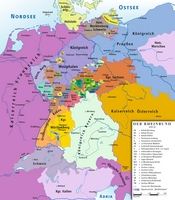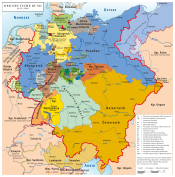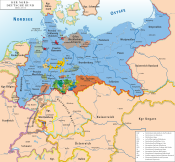Principality of Reuss-Gera
You can help expand this article with text translated from the corresponding article in German. (August 2012) Click [show] for important translation instructions.
|
Principality of Reuss-Gera Fürstentum Reuß-Gera (German) | |||||||||
|---|---|---|---|---|---|---|---|---|---|
| 1806–1918 | |||||||||
| Motto: Ich bau auf Gott "I build on God" | |||||||||
| Anthem: Heil unserm Fürsten, Heil! "Hail to our Prince, Hail!" | |||||||||
 The Reuss Junior Line within the German Empire | |||||||||
 The Reuss Junior Line within Thuringia | |||||||||
| Capital | Gera | ||||||||
| Government | Principality | ||||||||
| Prince | |||||||||
• 1806–1818 | Heinrich XLII | ||||||||
• 1818–1854 | Heinrich LXII | ||||||||
• 1854–1867 | Heinrich LXVII | ||||||||
• 1867–1913 | Heinrich XIV | ||||||||
• 1913–1918 | Heinrich XXVII | ||||||||
| Minister of State | |||||||||
• 1825–1839 | Gustav von Strauch | ||||||||
• 1918 | Paul Ruckdeschel | ||||||||
| History | |||||||||
• Established | 9 April 1806 | ||||||||
• Disestablished | 11 November 1918 | ||||||||
| Area | |||||||||
| 1905 | 827 km2 (319 sq mi) | ||||||||
| Population | |||||||||
• 1905 | 144,570 | ||||||||
| |||||||||
The Principality of Reuss-Gera (Template:Lang-de), called the Principality of Reuss Junior Line (Template:Lang-de) after 1848, was a sovereign state in modern Germany, ruled by members of the House of Reuss.[1] It was one of the successor states of the Imperial County of Reuss. The Counts Reuss, with their respective capitals and Residenzen at Gera, Schleiz, Lobenstein, Köstritz and Ebersdorf were all elevated to the title of prince (Fürst) in 1806, and their successor branch heads shared that title, while their cadets were also each titled prince (Prinz).[1] Thus all males of the family were properly "Prince Heinrich (Roman numeral) Reuss, J.L.", without use of a nobiliary particle, although for convenience their branch names remained in colloquial use (for example, "Prince Heinrich I Reuss of Köstritz").
Territory
The territories of four separate branches of the Junior Line amalgamated between 1824 and 1848, at which time the seniormost line of Gera retained sovereignty over the surviving cadet branches, which retained succession rights to the princely throne.[1] In 1905, the principality of Reuss Junior Line had an area of 827 km2 (319 square miles) and a population of 145,000, with Gera as its capital.
In the aftermath of World War I, the territory of the Junior Line merged with that of the Elder Line in 1919 as the People's State of Reuss, which became part of the new state of Thuringia on 1 May 1920.
The princely house
The House of Reuss practises a unique system of naming and numbering the male members of the family, every one of whom for centuries has borne the name "Heinrich", followed by a Roman numeral.[1] While most royal and noble houses assign a regnal number only to the ruling head of the house, and that in the sequential order of their reigns, the Reuss Junior Line ("Reuss, J.L.") used a numbering sequence for all male family members which began afresh with the first son born in each century. The male children within a single nuclear family need not bear sequential numbers, as all members of the larger family share the common numbering system. For example, the sons of Prince Heinrich LXVII Reuss of Schleiz, in order of their births, were named Heinrich V, Heinrich VIII, Heinrich XI, Heinrich XIV, and Heinrich XVI, with their male-line kinsmen holding the numerals in between according to the order of their births. In consequence of this naming system, certain heads of the Reuss Junior Line have had the highest numbers attached to their name of any European ruling families. The designation of "Junior Line" was dropped in 1930; the Elder Line ("Reuss, A.L.") had become extinct as its last male member, Heinrich XXIV, renounced his rights as sovereign in 1918 and died unmarried in 1927.[1]
A notable member of this family, Augusta Reuss-Ebersdorf (1757–1831), became the maternal grandmother of Queen Victoria of the United Kingdom.
Counts of Plauen
One of the younger sub-lines of the branch which ruled the Reuss, J.L. until 1918, includes the "Counts of Plauen" from the late 19th century. When Prince Heinrich XXVI Reuss (1857-1913) married Countess Viktoria von Fürstenstein (1863-1949) in 1885, under the strict marriage rules then enforced by the Reuss dynasty, although he was but a younger son of a minor ruling family, their children were not allowed to bear the dynasty's princely title. They were, instead, designated "Counts of Plauen", although they remained in the line of succession to the two thrones of Reuss[1] The Fürstensteins lacked Uradel status: Viktoria's paternal grandfather, Pierre-Alexandre Le Camus (1774-1824), son of a minor noble French notary living in Martinique, rose to become foreign minister in Jerome Bonaparte's Kingdom of Westphalia, was ennobled there in 1807 and made a count of the French Empire in 1817)[verification needed].[2]
When the German Empire collapsed at the end of World War I, the reigning Prince Reuss lost his crown along with all the other monarchs whose realms were within Germany. In 1927, Henrich XXVI's son, known as Count Heinrich Harry of Plauen (1890-1951), was adopted by his childless uncle, Prince Heinrich XXX (1864-1939), and the now-deposed dynasty agreed to accept him as "Prince Heinrich Harry Reuß", along with those of his male-line descendants born of unions complying with the family's 1902 rules that permitted marriages to countesses (Heinrich Harry's wife, Huberta von Tiele-Winckler was only a baroness in her own right, but belonged to a family of comital rank in Prussia).[1] Their son Heinrich Enzio was thus accepted by the House of Reuss as a prince, but his own marriage to Baron Gustaf Peyron's daughter in 1949 occurred before the Reuss family conference of 1957 which lowered the marital standard again,[1] allowing dynastic inter-marriage with baronial families.
Strictly, therefore, since 1996 the House of Reuss recognized Prince Heinrich Ruzzo Reuss by that title, but without official membership in the dynasty or entitlement to the traditional style of Serene Highness,[1] while in German law the title is allowed since 1919 only as part of the surname, thus "Heinrich Ruzzo Prinz Reuss".
Princes of Reuss-Gera (1806–1918)
- Heinrich I, Lord of Reuss-Schleiz 1666-1673, Count of Reuss-Schleiz 1673-1692 (1639-1692)
- Heinrich XI, Count of Reuss-Schleiz 1692-1726 (1669-1726)
- Heinrich I, Count of Reuss-Schleiz 1726-1744 (1695-1744)
- Heinrich XII, Count of Reuss-Schleiz 1744-1784 (1716-1784)
- Heinrich XLII, Count of Reuss-Schleiz from 1784, 1st Prince 1806-1818 (1752-1818)
- Heinrich LXII, 2nd Prince 1818-1854 (1785-1854)
- Heinrich LXVII, 3rd Prince 1854-1867 (1789-1867)
- Heinrich XIV, 4th Prince 1867-1913 (1832-1913)
- Heinrich XXVII, 5th Prince 1913-1918 (1858-1928)
- Heinrich XIV, 4th Prince 1867-1913 (1832-1913)
- Heinrich XLII, Count of Reuss-Schleiz from 1784, 1st Prince 1806-1818 (1752-1818)
- Heinrich XXIV, Count of Reuss-Schleiz-Köstritz 1692-1748 (1681-1748) (de), all surviving dynasts descend from him
- Heinrich XI, Count of Reuss-Schleiz 1692-1726 (1669-1726)
Monarchy abolished in 1918.
Heads of the House of Reuss
- Heinrich XXVII, 1918-1928 (1858-1928), became "Prince Reuss" 1927 on death of last Prince of the Elder Line
- Heinrich XLV, Prince Reuss 1928-1945/1962 (1895-1945/1962), missing 1945, declared dead 1962, headship passed to 7th cousin once removed (see below)
- Heinrich XXIV, Count of Reuss-Köstritz 1692-1748 (1681-1748), from above
- Heinrich IX, Count of Reuss-Köstritz middle line 1748-1780 (1711-1780), second surviving son
- Prince Heinrich XLIV of Reuss-Köstritz (1753-1832)
- Prince Heinrich LXIII of Reuss-Köstritz (1786-1841)
- Heinrich IV, 4th Prince Reuss zu Schleiz-Köstritz 1878-1894 (1821-1894)
- Heinrich XXIV, 5th Prince Reuss zu Schleiz-Köstritz 1894-1910 (1855-1910)
- Heinrich XXXIX, 6th Prince Reuss zu Schleiz-Köstritz 1910-1945 (1891-1946), renounced title
- Heinrich IV, 7th Prince Reuss zu Schleiz-Köstritz 1945-1962, Prince Reuss 1962–2012 (1919-2012)
- Heinrich XIV, Prince Reuss 2012–present (born 1955)
- (1) Heinrich XXIX, Hereditary Prince Reuss (born 1997)
- (2) Prince Heinrich V Reuss (born 2012)
- Heinrich XIV, Prince Reuss 2012–present (born 1955)
- Prince Heinrich VII Reuss (1927-2002)
- (3) Prince Heinrich XIX Reuss (born 1974)
- (4) Prince Heinrich XXI Reuss (born 1976)
- Heinrich IV, 7th Prince Reuss zu Schleiz-Köstritz 1945-1962, Prince Reuss 1962–2012 (1919-2012)
- Heinrich XXXIX, 6th Prince Reuss zu Schleiz-Köstritz 1910-1945 (1891-1946), renounced title
- Heinrich XXIV, 5th Prince Reuss zu Schleiz-Köstritz 1894-1910 (1855-1910)
- Prince Heinrich XII (1829-1866)
- Prince Heinrich XXVIII (1859-1924, renounced his titles 1908)
- Prince Heinrich XXXIV (1887-1956)
- Prince Heinrich I (1910-1982)
- (5) Prince Heinrich VIII (born 1944)
- (6) Prince Heinrich XX (born 1975)
- (7) Prince Heinrich XXIII (born 1979)
- (8) Prince Heinrich IX (born 1947)
- (9) Prince Heinrich XXVI (born 1988)
- (10) Prince Heinrich X (born 1948)
- (11) Prince Heinrich XXIV (born 1984)
- (5) Prince Heinrich VIII (born 1944)
- Prince Heinrich III (1919-1993)
- (12) Prince Heinrich XII (born 1950)
- (13) Prince Heinrich XXI (born 1976)
- (14) Prince Heinrich III (born ca. 2010)
- (15) Prince Heinrich IV (born 2011)
- (16) Prince Heinrich XXV (born 1984)
- (13) Prince Heinrich XXI (born 1976)
- (17) Prince Heinrich XVII (born 1968)
- (18) Prince Heinrich II (born 2004)
- (12) Prince Heinrich XII (born 1950)
- Prince Heinrich I (1910-1982)
- Prince Heinrich XXXIV (1887-1956)
- Prince Heinrich XXVIII (1859-1924, renounced his titles 1908)
- Heinrich IV, 4th Prince Reuss zu Schleiz-Köstritz 1878-1894 (1821-1894)
- Prince Heinrich LXXIV (1798-1886), third surviving son, descendants survive as Count of Plauen Line
- Prince Heinrich LXIII of Reuss-Köstritz (1786-1841)
- Prince Heinrich XLIV of Reuss-Köstritz (1753-1832)
- Heinrich XXIII, Count of Reuss-Schleiz-Köstritz junior line 1748-1787 (1722-1787), third surviving son, dynasts survive in 2015
- Heinrich IX, Count of Reuss-Köstritz middle line 1748-1780 (1711-1780), second surviving son
Other notable figures
- Princess Augusta Reuss of Köstritz (1822–1862)
- Prince Heinrich XXIV Reuss of Köstritz (1855–1910), composer
- Princess Eleonore Reuss of Köstritz (1860–1917), Tsaritsa of Bulgaria
- Prince Heinrich XXXII Reuss of Köstritz, heir presumptive to Wilhelmina of the Netherlands until 1909
- Princess Magdalena Reuss of Köstritz, wife of Prince Hubertus of Prussia
References
- ^ a b c d e f g h i "Reuß". Genealogisches Handbuch des Adels, Fürstliche Häuser, Band XVI (in German). Glücksburg: C.A. Starke Verlag. 2001. pp. 127–128, 139–140, 592–593. ISBN 978-3-7980-0824-3.
- ^ "Le Camus Pierre Alexandre, comte de Furstenstein". Les Amis et Passionnés du Père-Lachaise (APPL) (in French). 28 December 2009. Retrieved 8 February 2019.
- Principality of Reuss-Gera
- States and territories disestablished in 1918
- Reuss
- States and territories established in 1806
- Gera
- House of Reuss
- States of the Confederation of the Rhine
- States of the German Empire
- States of the German Confederation
- Upper Saxon Circle
- 1806 establishments in Europe
- 1918 disestablishments in Germany
- 19th century in Germany by state
- States of the North German Confederation







